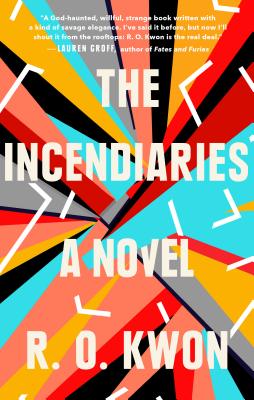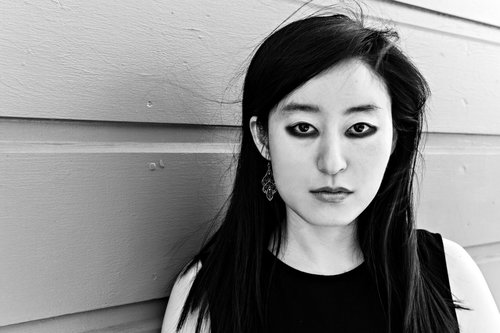- Categories:
A Q&A With R.O. Kwon, Author of August’s #1 Indie Next List Pick
- By Liz Button
Booksellers have chosen the debut novel The Incendiaries by R.O. Kwon (Riverhead, July 31) as their number-one pick for the 2018 August Indie Next List.
 The book, also a choice for the Summer/Fall 2018 Indies Introduce program, explores the romantic relationship between two college students, Phoebe Lin and Will Kendall, who meet during their first month of school. Phoebe, grieving and guilt-ridden over the death of her mother, is drawn into an extremist religious cult founded by a charismatic man whose mysterious past involves North Korea and Phoebe’s Korean American family. Meanwhile, Will, a scholarship student who transfers from Bible college after losing his faith, devotes himself to finding Phoebe, who disappears when the cult bombs an abortion clinic.
The book, also a choice for the Summer/Fall 2018 Indies Introduce program, explores the romantic relationship between two college students, Phoebe Lin and Will Kendall, who meet during their first month of school. Phoebe, grieving and guilt-ridden over the death of her mother, is drawn into an extremist religious cult founded by a charismatic man whose mysterious past involves North Korea and Phoebe’s Korean American family. Meanwhile, Will, a scholarship student who transfers from Bible college after losing his faith, devotes himself to finding Phoebe, who disappears when the cult bombs an abortion clinic.
“R.O. Kwon’s debut knocked me sideways,” said John Francisconi, manager of Bank Square Books in Mystic, Connecticut. “The Incendiaries is a serious reckoning with the problem of fanaticism and the violence of blind devotion. The story of Will and Phoebe is told with an extraordinarily smart and soulful style. I was amazed at how perfectly Kwon’s spare language fit her novel’s expansive scope. A stunning portrait of what faith can do and undo, The Incendiaries will delight and disturb. But, most of all, it will impress.”

Born in South Korea, Kwon has lived most of her life in the U.S. She is a National Endowment for the Arts Literature Fellow and has an MFA from Brooklyn College, and her writing has been published or is forthcoming in The Guardian, Vice, Buzzfeed, Time, Noon, Electric Literature, and Playboy, among other places. Kwon has received awards from Yaddo, the MacDowell Colony, the Bread Loaf Writers’ Conference, the Sewanee Writers’ Conference, Omi International, the Steinbeck Center, and the Norman Mailer Writers’ Colony.
Here, Bookselling This Week speaks with Kwon about her book’s exploration of faith and its loss.
Bookselling This Week: Congratulations on booksellers choosing your debut work as their number one pick for the August Indie Next List!
R.O. Kwon: Thank you! I’m so excited. I always look at those lists and I secretly really wanted this to happen but I also knew how long of a shot it was. I’m so grateful for booksellers and their support. Honestly, with the work that booksellers do, we would be nowhere without them. Hearing from booksellers about the book has been one of the most exciting parts of this whole experience.
BTW: Where did you get the idea to write this book?
RK: The idea began with my interest in writing about the loss of faith as well as about the gaining of faith. I really wanted to cover how joyful and wonderful and complicated it can be to gain faith and how terrible it can be to lose it. It came very much from my own upbringing. I grew up deeply religious. My life plan was to become a preacher or a missionary or maybe even a religious recluse, and then at 17 I lost my faith and it was really catastrophic for me.
BTW: Did you have to, in that case, go back and revisit some very painful emotional territory to write this book?
RK: Now I’m not religious at all, but I’ve realized that with this book I was spending so much time with a God in whom I no longer believed: I was listening to religious music, I was reading the Bible a lot, I was reading religious thinkers a lot. I joke — and I guess it’s not a joke — that I spent more time with a God in whom I don’t believe than I might have if I were still immersed in religion.
BTW: In addition to your religious reading, did you also research topics like cults, terrorism, and extremism?
RK: Yes, there were periods where I researched each of them and read everything I could. I went on a nonfiction tear, but then after that I tried to forget everything I’d read because I really wanted this cult to be the novel’s own cult and I wanted the terrorists to have their own terrorism. I didn’t want it to be directly based on anything that I had read.
There was one part where I put in a lot of research beforehand, which turned out to not be all that necessary, but I’m still glad I did it. It was hearteningly difficult to figure out how the bomb in the novel would go off — just logistically how that would work. It was really, really hard to find reliable information, not just based on my passing knowledge of bombs from fiction and movies, but to have some sense of how these people could build a bomb that would take down a whole building. Eventually, I was able to talk to someone who was a demolitions expert for the Army, and he gave me some general information.
BTW: Was examining and trying to identify with Phoebe’s grief a major part of creating her character?
RK: Yes, I’d say it was two things: the loss of her mother, for sure, and the ways in which she believed she was to blame have a big effect on who Phoebe is, but also giving up the piano, which she was so passionate about and which was really the organizing principle of her life. She lost what she thought she was going to be. It’s very hard stepping away from something so all-consuming as working toward becoming a professional musician. In my research, I learned that at least some terrorist groups recruit on college campuses around the world because college is a time when a lot of people are trying to figure themselves out. A lot of people might feel lost; people are uprooted from their old lives. College does tend to be where people are in the beginning stages of becoming, which is often an unstable place to be.
BTW: It seems as if Will sees Phoebe as someone who will fill the God-shaped void in his life. In writing this, were you also trying to explore the idea of a link between religious and romantic obsession?
RK: Yes, what I remember most about having religion and what I miss the most about it was how much I loved my idea of God and how consuming that love was and how thrilling it was. To love is to love, and in that way I think they can be very similar. I tend to be hesitant about generalizing, given other people’s experiences, but for me I think they were.
BTW: Have you always wanted to be a writer?
RK: I always loved reading and I knew I wanted to be a writer starting around high school. Then when I went to college, I took writing classes and I absolutely loved them, but I’m an immigrant and my parents are immigrants and it didn’t seem clear to me that being a writer was an available path — I just thought that I might need health insurance and things like that. So I worked for a consulting firm in New York and was miserable, in part because the job was terrible, but also because I wasn’t writing.
I remember looking out the window on a flight that I was taking for work. The view was beautiful, and I was thinking to myself, if I give up writing I’ll have no reason to try to describe it to myself, and that made me feel just so sad. It made me feel like there was no point to the beauty, in a way, if I wasn’t trying to describe it in words. So that was a pivotal moment for me: realizing how I much I needed that and how much that gave purpose to my life.
BTW: What are some of your favorite local bookstores?
RK: A few of the bookstores I frequent near where I live in the Bay Area are Green Apple and Green Apple Books on the Park, The Booksmith, Book Passage, East Bay Booksellers, Alley Cat Books, Pegasus Books, Walden Pond Books, Copperfield’s Books, Point Reyes Books, Folio Books, City Lights, and Dog Eared Books, among others. I feel incredibly spoiled — the Bay Area has such great bookstores. It’s out of this world.
I’m going to be away on tour from July 31, when the book comes out, to mid-November: 35 events in 17 cities. I’m so excited because there are so many bookstores on the list that I’ve been a fan of and have been following on social media from afar. So it will be delightful.

